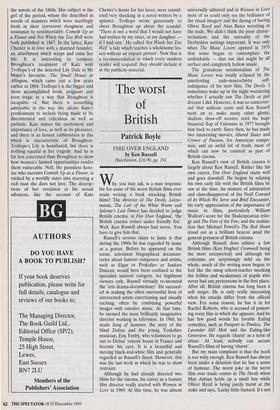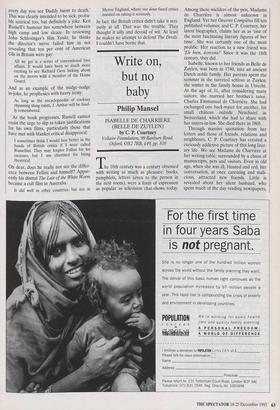The worst of British
Patrick Boyle
FIRE OVER ENGLAND by Ken Russell Hutchinson, £16.99, pp. 192 Why, you may ask, is a man responsi- ble for some of the worst British films ever made writing a book attacking British films? The director of The Devils, Liszto- mania, The Lair of the White Worm and Salome's Last Dance has decided to judge British cinema: in Fire Over England, 'the British cinema comes under friendly fire'. Well, Ken Russell always had nerve. You have to give him that.
Russell's serious claim to fame is that during the 1960s he was regarded by many as a genius. Before he appeared on the scene, television biographical documen- taries about famous composers and artists, such as Elgar or Prokofiev or Isadora Duncan, would have been confined to the specialist interest category, for highbrow viewers only. Russell virtually re-invented the 'arts drama-documentary'. He succeed- ed in making the often uneventful lives of introverted artists entertaining and visually exciting, often by combining powerful images with emotive music. At that time, he seemed the most brilliantly imaginative director working in television. In 1968, he made Song of Summer, the story of the blind Delius and the young Yorkshire musician, Eric Fenby, who volunteers to go out to Delius' remote house in France and become his eyes. It is a beautiful and moving black-and-white film and generally regarded as Russell's finest. However, this- was the last work in which he was to show restraint.
Although he had already directed two films for the cinema, his career as a feature film director really started with Women in Love in 1969. At this time, he was almost universally admired and in Women in Love most of us could only see the brilliance of the visual imagery and the daring of having Oliver Reed and Alan Bates wrestling in the nude. We didn't think the poor charac- terisations and the unreality of the Derbyshire settings important. It was only when The Music Lovers opened in 1970 that some began to contemplate the unthinkable — that our idol might be all surface and completely hollow inside.
The gratuitous senationalism of The Music Lovers was totally eclipsed by the unrelenting sado-mascochistic self- indulgence of his next film, The Devils. I sometimes wake up in the night wondering whether I actually saw The Devils or just dreamt I did. However, it was so controver- sial that millions came and Ken Russell went on to make many other glossy, shallow, show-off movies, until the huge financial flop of Valentino in 1977 brought him back to earth. Since then, he has made two interesting movies, Altered States and Crimes of Passion, for American compa- nies, and an awful lot of trash, most of which can now be counted as part of British cinema.
Ken Russell's view of British cinema is largely about Ken Russell. Rather like his own career, Fire Over England starts well and goes downhill. He begins by relating his own early life with the British films he saw at the time: his mixture of admiration and class-disapproval of the Noel Coward of In Which We Serve and Brief Encounter, his early appreciation of the importance of music in films, particularly William Walton's score for the Shakespearian trilo- gy and The First of the Few, and the realisa- tion that Michael Powell's The Red Shoes stood out as a brilliant beacon amid the general greyness of British cinema.
Although Russell does admire a few British films (Ken Hughes' Cromwell being the most unexpected) and although his criticisms are surprisingly mild on the whole, much of the writing soon begins to feel like the smug school-teacher mocking the foibles and weaknesses of pupils who never had any pretensions in the first place. After all, British cinema has long been a soft target. He is only really interesting when his attacks differ from the official view. For some reason, he has it in for Rachel Roberts, who is accused of poison- ing every film in which she appears. And he has few good words for lovable Ealing comedies, such as Passport to Pimlico, The Lavender Hill Mob and the Ealing-like Genevieve. He regards 'charm' as a term of abuse. At least, nobody can accuse Russell's films of having 'charm'.
But my main complaint is that the book is not witty enough. Ken Russell has always been under a delusion that he has a sense of humour. The worst joke in the worst film ever made comes in The Devils when Max Adrian holds up a small boy while Oliver Reed is being juicily burnt at the stake and says, 'Lucky little bastard. It's not every day you see Daddy burnt to death.' This was clearly intended to be sick, proba- bly satirical too, but definitely a joke. Ken Russell's humour lies somewhere between high camp and low sleaze. In reviewing John Schlesinger's film Yanks, he thinks the director's nerve failed him in not revealing that ten per cent of American GIs in Britain were gay:
All we get is a series of conventional love affairs. It would have been so much more exciting to see Richard Gere larking about on the moors with a member of the Home Guard.
And as an example of the nudge-nudge in-joke, he prophesies with heavy irony:
As long as the encyclopaedia of cockney rhymning slang exists, J. Arthur will be fond- ly remembered.
As the book progresses, Russell cannot resist the urge to slip in token justifications for his own films, particularly those that have met with blanket critical disapproval: I sometimes think I would fare better in the hands of British critics if I were called Russellini. They may forgive Fellini for his excesses, but I am chastised for being theatrical.
Oh dear, does he really not see the differ- ence between Fellini and himself? Appar- ently his dismal The Lair of the White Worm became a cult film in Australia.
It did well in other countries, but not in Merrie England, where our dour-faced critics insisted on taking it seriously.
In fact, the British critics didn't take it seri- ously at all. That was the trouble. They thought it silly and devoid of wit. At least he makes no attempt to defend The Devils. I couldn't have borne that.











































































































 Previous page
Previous page